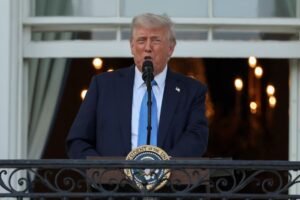The African Democratic Congress, ADC, has strongly criticised President Bola Tinubu’s administration over what it described as “fiscal vandalism,” following the National Assembly’s recent approval of an additional $21 billion in foreign loans.
In a statement released on Sunday by the party’s National Publicity Secretary, Mallam Bolaji Abdullahi, the ADC warned that the new borrowing spree could push Nigeria’s total public debt above N200 trillion by the end of 2025, with little to no visible economic benefits.
“What Nigerians are witnessing, following the approval of a fresh $21 billion in foreign loans, is nothing short of a calculated decision to mortgage the country’s future just to cover up the failures of today,” the party stated.
The ADC compared current debt levels to those under former President Muhammadu Buhari, noting that Buhari’s administration borrowed an average of N4.7 trillion annually, while Tinubu’s borrowing has surged to N49.8 trillion per year.
“In just two years, this administration has borrowed more than ten times what Buhari borrowed in the same timeframe.”
“At this rate, Nigeria’s total public debt will crash through N200trn before the end of the year. We are speeding toward a financial cliff, and those in charge seem to have no brakes,” the statement said.
The party dismissed comparisons made by Tinubu’s supporters who argue that the debt appears smaller in dollar terms—$1.7 billion annually compared to Buhari’s $4.15 billion—by pointing to the weakened value of the naira.
“With the naira now in free fall, again thanks to this administration’s poor policy choices, these same loans are costing the country far more,” the statement read.
“When converted to naira, Tinubu’s foreign borrowing amounts to N25.5trn every year, more than Buhari’s annual average of N2.2trn.”
The ADC highlighted that Nigeria’s public debt has ballooned from N12.6 trillion in 2015 to over N149 trillion in 2025. It further claimed that more than $35 billion has been borrowed from foreign lenders in the last decade.
“Our debt to the World Bank has tripled. What we owe in Eurobonds has grown eleven times over. And now, this government wants to borrow even more, pushing our foreign debt ceiling to $67bn.”
Despite the rising debt, the party argued that the loans have not translated into tangible improvements in infrastructure, education, healthcare, or power.
“The debts have continued to mount, but infrastructures have remained poor, universities are still grossly underfunded, hospitals are still ill-equipped, and the electricity supply is as poor as ever. So, what exactly are these loans used for?” it queried.
“This is the question that Nigerians expect the National Assembly to ask. Instead, it has continued to approve these loans without asking the hard questions, without demanding a plan, and without standing up for the Nigerian people.”
Referencing data from the Association of Small Business Owners of Nigeria, the ADC said many businesses now struggle to access credit while investor confidence continues to decline.
“And because over 60 per cent of our national income is now used to service debt, the government is turning to ordinary Nigerian families and taxing them beyond their limits.”
The party also criticised continued external borrowing in the wake of recent naira devaluations, arguing that such a development should ideally reduce the need for more foreign loans.
As part of its demands, the ADC called for full transparency and public disclosure of all loans taken since 2015.
“The ADC hereby demands a full disclosure of all loan agreements signed over the past ten years by the APC and the Tinubu government. Nigerians have a right to know the terms, interest rates, payment timelines, and final recipients of the loans.”
Concluding its statement, the party urged President Tinubu to end what it termed “fiscal recklessness” and to prioritise meaningful economic reforms.
“We also call on President Tinubu to put an end to this fiscal recklessness and focus instead on meaningful reform by investing wisely and spending responsibly. The era of borrowing to cover policy failures must come to an end.”
Efforts to get the reactions of Bayo Onanuga, Special Adviser on Information, and Daniel Bwala, Special Adviser on Policy Communication, were unsuccessful at the time of filing this report.









